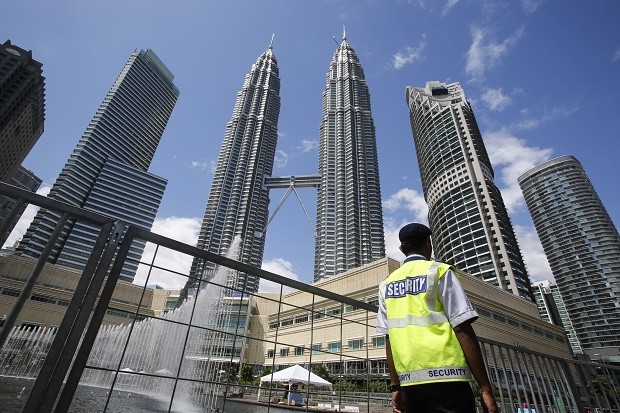
A security guard patrols in front of Malaysia’s landmark buildings, Petronas Twin Towers, in Kuala Lumpur, Malaysia, Thursday, Dec. 31, 2015. AP FILE
KUALA LUMPUR, Malaysia — Currency woes erode wages and may lead to exodus, leaving employers short of labor.
Naim Ahmed, a Bangladeshi floor manager at a popular pub in Kuala Lumpur’s Sri Hartamas suburb, likes the life that he has built in six years as a migrant worker in Malaysia.
But the recent depreciation of the ringgit and the widely held view that the currency could weaken further is forcing him to consider returning home or looking for employment elsewhere.
Asian currencies have been battered following Donald Trump’s surprise victory in the United States’ presidential election, with the ringgit the hardest hit because of concerns that the country’s regulators may impose capital controls to check the slide.
“When I first arrived in 2012, 1 ringgit would give me 27 (Bangladeshi) taka. Now after the deductions, I am lucky to get 17 taka (21 US cents),” said the lanky 28-year-old, who adds that the roughly 37 per cent drop in his wages over the last six years has made it difficult for him to meet the monthly installment payments on his debt to an employment agency in Dhaka and send money to his wife and mother.
Asian currencies have been battered following Donald Trump’s surprise victory in the United States’ presidential election, with the ringgit the hardest hit because of concerns that the country’s regulators may impose capital controls to check the slide.
The Malaysian currency has slipped more than 5.4 per cent over the last one month against the greenback, making it the second-biggest decliner after the Japanese yen.
Apart from slumping to an all-time low of 3.12 ringgit against the Singapore dollar this week, the ringgit has also lost ground to other currencies such as the Indonesian rupiah and the Bangladeshi taka.
The slide is taking a toll on an economy highly dependent on foreign labor.
The slide is taking a toll on an economy highly dependent on foreign labor.
“The large companies are considering making adjustments in the wages and subsidizing the amount of money workers can send home. But workers for smaller companies are unlikely to renew their employment permits because of the high cost,” Shamsuddin Bardan, executive director of the Malaysian Employers Federation (MEF), told The Straits Times.
According to the MEF, there are 2.1 million legal foreign workers out of the country’s workforce of roughly 15.4 million.
However, there are estimated to be another 2.2 million unregistered or illegal workers, which means the total number of foreign workers breaches the government’s limit of 15 per cent of the entire workforce.
To counter the potential exodus of foreign workers, Bardan said that MEF has made representations to the government to consider allowing the roughly 160,000 refugees in the country, comprising mainly Rohingya and a smattering of Syrians, to fill the void.
“The government may wish to treat refugees allowed to work differently and not necessarily under temporary work permits like the foreign workers currently,” said Bardan.
But MEF is unclear about how such a plan will be implemented.
“The government may wish to treat refugees allowed to work differently and not necessarily under temporary work permits like the foreign workers currently,” said Bardan.
According to the United Nations’ refugee agency UNHCR, there are no refugee camps in Malaysia and most refugees rent rooms or put up shacks in squatter shanties.
There are a large number scattered all over the country who stay below the radar and take up informal work to survive.
The UNHCR has been trying to coax large corporations to provide informal work for those stranded in Malaysia but refugee aid groups say there has been very little progress.
“There are also serious socio-economic consequences because the influx of poorly paid and unskilled workers will have a depressive effect on the wages of Malaysian workers at the lower level,” he said.
Several economists argue that the proposal to tap the country’s refugee population to help stresses in the workforce would do Malaysia more harm.
Manu Bhaskaran, chief executive of Centennial Asia Advisors, noted that the country’s overdependence on foreign workers is a huge disincentive for local companies to move up the value chain and improve Malaysia’s economic competitiveness.
“There are also serious socio-economic consequences because the influx of poorly paid and unskilled workers will have a depressive effect on the wages of Malaysian workers at the lower level,” he said.
The downward pressure on the ringgit in foreign exchange markets is expected to continue in the coming weeks.
While Bank Negara, Malaysia’s central bank, has repeatedly insisted in recent weeks that it will not impose capital controls, foreign investors remain on edge, said currency dealers.
Foreigners own roughly half of the Malaysian government bond market, which has come under selling pressure in recent weeks as investors seek to liquidate their ringgit positions.
Bond yields rise when prices fall and the yield on Malaysia’s benchmark 10-year government bond has risen to 4.35 per cent, from 3.62 per cent early last month. CBB/rga